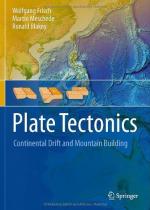|
This section contains 273 words (approx. 1 page at 300 words per page) |

|
Plate tectonics is the theory explaining geologic changes that result from the movement of lithospheric plates over the asthenosphere (the molten, ductile, upper portion of the earth's mantle). The visible continents, a part of the lithospheric plates upon which they ride, shift slowly over time as a result of the forces driving plate tectonics. Moreover, plate tectonic theory is so robust in its ability to explain and predict geological processes that it is equivalent in many regards to the fundamental and unifying principles of evolution in biology, and nucleosynthesis in physics and chemistry.
Based upon centuries of cartographic depictions that allowed a good fit between the western coast of Africa and the eastern coast of South America, in 1858, French geographer Antonio Snider-Pellegrini, published a work asserting that the two continents had once been part of larger single continent ruptured by the creation and intervention of the...
|
This section contains 273 words (approx. 1 page at 300 words per page) |

|


